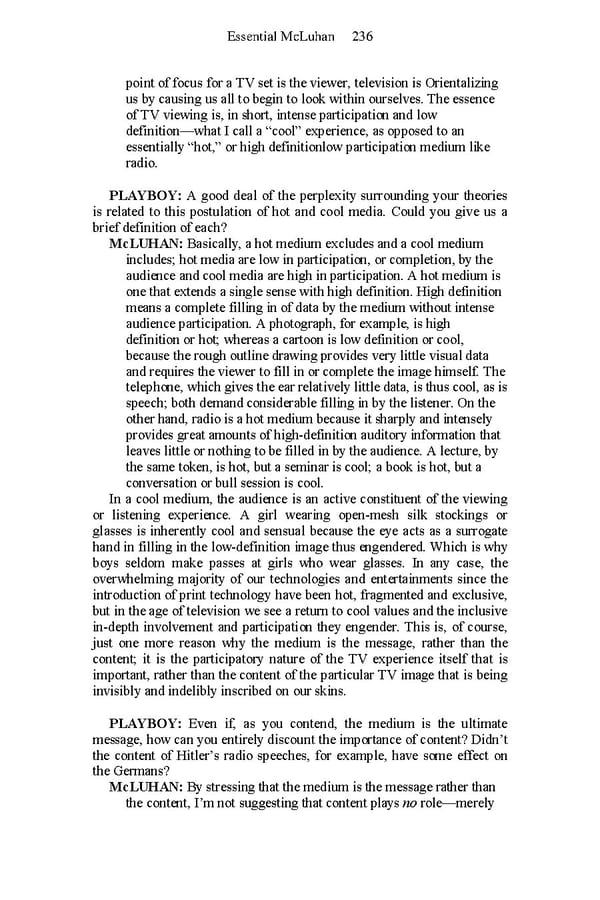Essential McLuhan 236 point of focus for a TV set is the viewer, television is Orientalizing us by causing us all to begin to look within ourselves. The essence of TV viewing is, in short, intense participation and low definition—what I call a “cool” experience, as opposed to an essentially “hot,” or high definitionlow participation medium like radio. PLAYBOY: A good deal of the perplexity surrounding your theories is related to this postulation of hot and cool media. Could you give us a brief definition of each? McLUHAN: Basically, a hot medium excludes and a cool medium includes; hot media are low in participation, or completion, by the audience and cool media are high in participation. A hot medium is one that extends a single sense with high definition. High definition means a complete filling in of data by the medium without intense audience participation. A photograph, for example, is high definition or hot; whereas a cartoon is low definition or cool, because the rough outline drawing provides very little visual data and requires the viewer to fill in or complete the image himself. The telephone, which gives the ear relatively little data, is thus cool, as is speech; both demand considerable filling in by the listener. On the other hand, radio is a hot medium because it sharply and intensely provides great amounts of high-definition auditory information that leaves little or nothing to be filled in by the audience. A lecture, by the same token, is hot, but a seminar is cool; a book is hot, but a conversation or bull session is cool. In a cool medium, the audience is an active constituent of the viewing or listening experience. A girl wearing open-mesh silk stockings or glasses is inherently cool and sensual because the eye acts as a surrogate hand in filling in the low-definition image thus engendered. Which is why boys seldom make passes at girls who wear glasses. In any case, the overwhelming majority of our technologies and entertainments since the introduction of print technology have been hot, fragmented and exclusive, but in the age of television we see a return to cool values and the inclusive in-depth involvement and participation they engender. This is, of course, just one more reason why the medium is the message, rather than the content; it is the participatory nature of the TV experience itself that is important, rather than the content of the particular TV image that is being invisibly and indelibly inscribed on our skins. PLAYBOY: Even if, as you contend, the medium is the ultimate message, how can you entirely discount the importance of content? Didn’t the content of Hitler’s radio speeches, for example, have some effect on the Germans? McLUHAN: By stressing that the medium is the message rather than the content, I’m not suggesting that content plays no role—merely
 Essential McLuhan Page 242 Page 244
Essential McLuhan Page 242 Page 244